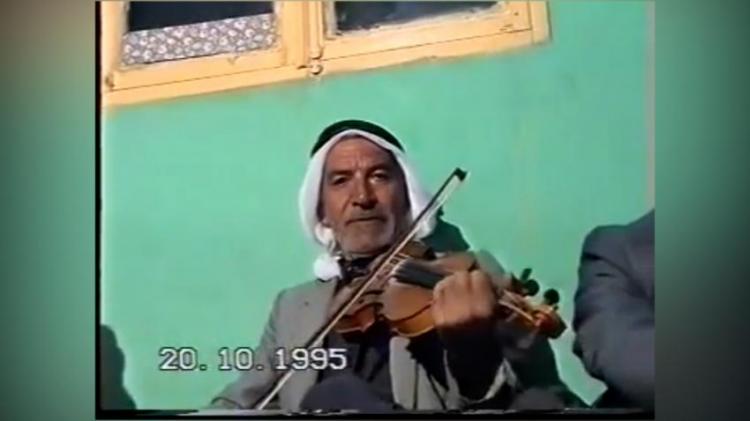KOBANI, Syria (North Press) – Rashid Sofi, an artist from the city of Kobani, recalls the musical nights shared with the late artist Mohammad Doman on chilly winter evenings. Sofi played the oud while Doman played the violin in a musical harmony, due to his knowledge of the maqams (traditional melodic modes used in Arabic music) that increased harmony between the two players.
Mohammad Ghazi, known as Mohammad Doman, was born in the village of Sheran in the countryside of Kobani in 1929. He died on Wednesday in a hospital in the Turkish capital, Ankara, at the age of 91.
Doman, known as a traditional artist and the first violinist in the city of Kobani, was famous for playing the violin throughout his career with the popular artist Baqi Khedo and performing traditional folk songs.
Sofi, who became acquainted with Doman in 1975, described Doman’s works as having a "Kobanian" tone, because “his music was in the Kobani dialect; he was playing the violin as if he was speaking to you with a Kobani dialect, and this is what led people to cling to him.”
“When we were talking about music, we used to understand each other. This thing does not exist now. There are many artists with whom I talk about music and maqams without understanding each other,” he added.
Sofi pointed out that Doman had a significant impact on the art career in the city of Kobani. “Baqi had no experience with the maqams, and he often could not match Doman in the musical classes that he played, so Doman was forced to play the [style] performed by Khedo.”
Doman was buried on Thursday in the village of Ziyarah in the countryside of Suruc, southern Turkey, adjacent to Kobani, because Turkey prevented his body from entering his hometown.
Dijwar Meshayed, the deputy head of the Culture Board in the Euphrates region, said that they contacted the relatives of Doman to deliver his body and implement his will to bury him in Kobani, bringing his body through the city of Jarablus and passing through Manbij.
He added that the Culture Board was ready to receive the body in the city of Manbij and hold burial ceremonies, taking into account the coronavirus procedures, “but we were surprised that Turkey prevented the body from entering Syrian territory.”
“An attempt will be made to transfer the remains of Doman to the city of Kobani with the end of coronavirus procedures in Turkey,” Meshayed said.
Kamel Hassan, an official in the folk-art department at Baqi Khedo Cultural Center, said that Doman was taught to play the violin in the 1950s by an Armenian. After he completed his military service, he and Khedo became friends, and they entered the field of art in Kobani and Suruc Plain, where there was no border at the time.
Doman has about 15 rhythmic songs of his lyrics and melodies, and he also participated in reviving concerts in Arab regions such as Jarablus and Manbij.
He played Turkish, Arabic, and Kurdish melodies, and spoke Arabic, Turkish, Kurdish, Armenian, and the Sorani Kurdish dialect, according to Hassan.
Hassan added that Doman and Khedo entered most of the houses of Suruc Plain to perform. They arrived in Urfa, Gaziantep, and the city of Aleppo, where they recorded two songs in one of its studios.
A number of Kobani’s artists recorded the songs of Doman, such as Siyamand Osekly, Mecho Gendash, Shad and Kamel Hassan.
“Doman insisted on staying in Kobani, but he was forced to leave because of ISIS’s war on the city. I met him in Gaziantep during the war. He was sad and always repeated his will to be buried in Kobani when he died,” Hassan said.
Reporting by Fattah Issa

